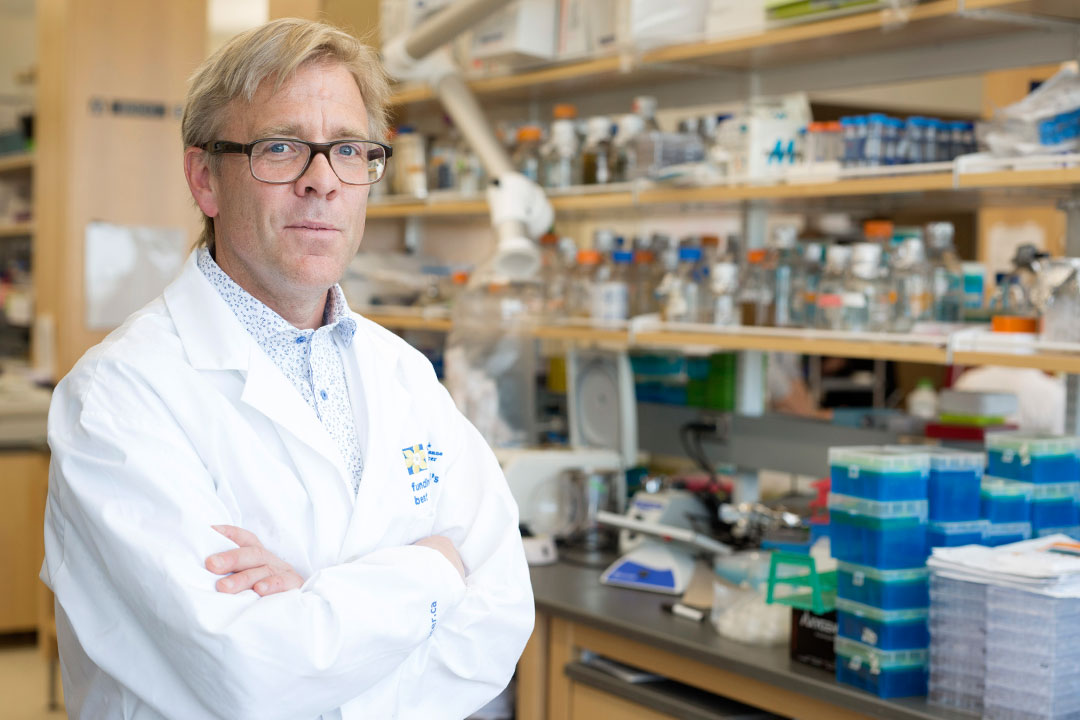
Nutrien Chair to lead improved cancer diagnosis and image-guided surgeries
University of Saskatchewan (Usask) medical researcher Dr. Ron Geyer (PhD) has been named the Nutrien Chair in Clinical Research to lead a cutting-edge five-year research program with potential to transform cancer care.
“This exciting $600,000 partnered investment will improve outcomes for cancer patients, while enhancing research and clinical collaborations among our College of Medicine, the Saskatchewan Health Authority, Royal University Hospital, and Royal University Hospital Foundation,” said USask Vice-President Research Karen Chad. “Saskatchewan clinicians and their patients will have access to state-of-the-art cancer imaging and surgery technologies.”
Geyer’s research program is part of the USask-led Advanced Diagnostic Research Laboratory (ADRL), a collaboration of the medical college, the Saskatchewan Cancer Agency, and the Saskatchewan Health Authority to develop new cancer diagnostic tests for Saskatchewan patients. Currently, many biopsies are being sent out of the province for testing. Faster results with in-province testing can positively impact patient outcomes.
In a second area of work, clinical trials will be conducted on two types of imaging antibodies to improve cancer diagnosis and tumor detection using PET-CT scanning, as well as enhancing image-guided surgeries that enable more precise tumor removal.
“Royal University Hospital Foundation commends Nutrien for its leadership, innovative thinking and forward-looking support to establish this clinical research chair,” said Arla Gustafson, CEO of the Royal University Hospital Foundation. “Nutrien is a great partner whose generosity in 2004, together with the leading-edge research of Dr. Geyer and his team, means our physicians and medical teams at RUH can continue to advance innovative patient care.”
Geyer’s research program builds on work at the USask Centre for Biologic Imaging Research and Development established by Geyer in 2014 with colleagues Dr. Humphrey Fonge (PhD) and Dr. Paul Babyn (MD). The team collaborates with the university’s Saskatchewan Centre for Cyclotron Sciences, managed by the Fedoruk Centre at USask, to develop the next generation of molecular imaging agents for cancer diagnostics.
Through clinical trials, Saskatchewan patients and clinicians will have first access to the new PET imaging probe and to the first molecular-targeted, image-guided surgical program in Canada.
“We are excited to be supported in these next phases of our work focused on precision medicine leading to new therapies and monitoring strategies tailored to individual patients,” said Geyer, a professor in pathology and laboratory medicine. His term as chair took effect October 1, 2019.
Working out of the ADRL in the USask Health Sciences Building, Geyer will provide the expertise and infrastructure necessary to train clinicians in the use of new molecular cancer tests for clinical care at Royal University Hospital (RUH), thereby reducing patient travel time for tests, decreasing test turnaround times, and improving therapy monitoring and surgical outcomes.
“Ron is a wonderful choice for this clinical research chair given the incredibly important work he and his team do that directly impacts patient care through cancer diagnostics, imaging and image-guided surgery,” said Dr. Marek Radomski (PhD), vice-dean research for the College of Medicine, which contributed $100,000 over five years.
The endowed chair was established in 2004 through a $1.5-million donation from Nutrien to Royal University Hospital Foundation to recognize excellence in clinical research at USask and accelerate clinical care within the Saskatchewan Health Authority at RUH.
View the original article on the USask news site.
